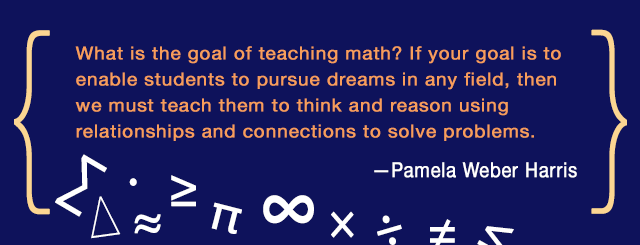
By Pamela Weber Harris (@pwharris), author of Lessons and Activities for Building Powerful Numeracy
When I talk to people about what I do—when I tell them that I teach math teachers—it's fairly common for people to avert their eyes, maybe even hunch their shoulders in a kind of sheepishness. “I’m not good at math,” they confess. “It’s just not my thing.”
To this I always smile, for I have never found that to be actually true of anyone. “What if I told you,” I respond, “that what you think is math is actually much more about rote memorization than true mathematical thinking? That you’ve most likely never been taught ‘real’ math?”
Just last week I had a conversation with a mechanical engineer. We got talking about what we do and his eyes lit up when he realized he’d found someone else who thought about math as he did. We shared a common experience that mathematics is about solving problems using relationships, drawing upon connections, and reasoning about patterns. We believe that math is figure-out-able!
—
What he found was that he could learn math rather than memorize it
—
His tale is common. He failed 7th grade math because the subject didn’t make sense to him. It seemed like a random assortment of made up “facts” that simply had to be memorized, facts that had no connection to the real world. He wasn’t “good” at it. Years later, at a university, that changed. Driven to pursue his dreams, he re-attacked math, determined that this one subject wouldn’t stop him. What he found was that he could learn it rather than memorize it. He found out that math is something to be understood, something that empowers creativity and innovation, something that is the antithesis of random and disconnected.
In contrast, “traditional math,” the practice of rote memorization of formulas and facts, is shallow and dead-ended. Its application is so profoundly limited that it is no wonder most Americans feel algebra and geometry are useless. By its nature, such an approach can only be used to solve problems in an artificially limited set. It shuts doors rather than opens them.
I recently spoke with a well-meaning colleague who disagrees with me on this point:
“But Pam,” she said, “Isn’t efficiency and minimal effort important? If I’m in a meeting, and need to do calculations, I can use an algorithm on a napkin and still pay attention to what is being spoken.” Her point was that there is an important place for rote procedures that take little thought.
My counter is another question, “What is the goal of teaching math?” If it is efficiency and mindlessness that you are valuing, then just use a calculator. You’re much more likely in this day and age to have one in your pocket than not. Conversely, if your goal is to enable students to pursue dreams in any field, then we must teach them to think and reason using relationships and connections to solve problems.
Carol Lloyd, executive editor of GreatSchools, said it another way:
“In the end, the skills required to solve a complex problem—to break the problem down into smaller parts, to approach it from different angles using different methods, to not getting intimidated or frustrated when the path isn’t obvious—are practical in any field of endeavor—from astrophysics to…parenting. Ideally, math prepares kids to be better thinkers no matter where they land.”
It doesn’t matter if a student can recall a fact instantly with no effort if their mechanism of solving doesn’t build understanding towards the future. It is true that there are some students for whom mathematical thinking comes more naturally, for whom traditional teaching provides immediate results. I was one such student. However, even those students are clinging to a ship that can only take them so far.
Eventually, whether it's trigonometry or calculus, memorization won’t be enough anymore. The ship will sink when it is built on rote memorization rather than depth of understanding—an understanding that can be broadly applied. Even before the digital revolution took hold, the ability to perform raw computation was of limited use. Now, with computers able to do anything you can reduce to an algorithm, it is even truer. The future frontier-blazers in STEM fields require comprehension, not computation. If we deny students this foundation in reason, we are limiting their future.
Yes, certain students will find some success with traditional methods…but any student can be successful and well-prepared for the future if the teaching is centered on relationships, connections, thinking, and reasoning. And isn’t that what teaching is all about?
♦ ♦ ♦ ♦
Pamela Weber Harris is the author of Building Powerful Numeracy for Middle & High School Students and Lessons & Activities for Building Powerful Numeracy and a frequent speaker at local and national conferences. A former secondary mathematics teacher, Pam currently teaches at The University of Texas, and is also a K-12 mathematics consultant and a T³ (Teachers Teaching with Technology) Instructor. Learn more about Pam and professional development opportunities with her on her website.


